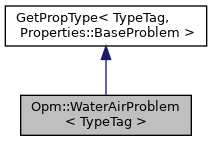Non-isothermal gas injection problem where a air is injected into a fully water saturated medium. More...
#include <waterairproblem.hh>

Public Member Functions | |
| WaterAirProblem (Simulator &simulator) | |
| void | finishInit () |
| Called by the Opm::Simulator in order to initialize the problem. More... | |
Boundary conditions | |
| template<class Context > | |
| void | boundary (BoundaryRateVector &values, const Context &context, unsigned spaceIdx, unsigned timeIdx) const |
| Evaluate the boundary conditions for a boundary segment. More... | |
Volumetric terms | |
| template<class Context > | |
| void | initial (PrimaryVariables &values, const Context &context, unsigned spaceIdx, unsigned timeIdx) const |
| Evaluate the initial value for a control volume. More... | |
| template<class Context > | |
| void | source (RateVector &rate, const Context &, unsigned, unsigned) const |
| Evaluate the source term for all phases within a given sub-control-volume. More... | |
Problem parameters | |
| std::string | name () const |
| The problem name. More... | |
| void | endTimeStep () |
| Called by the simulator after each time integration. More... | |
| template<class Context > | |
| const DimMatrix & | intrinsicPermeability (const Context &context, unsigned spaceIdx, unsigned timeIdx) const |
| template<class Context > | |
| Scalar | porosity (const Context &context, unsigned spaceIdx, unsigned timeIdx) const |
| template<class Context > | |
| const MaterialLawParams & | materialLawParams (const Context &context, unsigned spaceIdx, unsigned timeIdx) const |
| template<class Context > | |
| const SolidEnergyLawParams & | solidEnergyLawParams (const Context &, unsigned, unsigned) const |
| Return the parameters for the energy storage law of the rock. More... | |
| template<class Context > | |
| const ThermalConductionLawParams & | thermalConductionLawParams (const Context &context, unsigned spaceIdx, unsigned timeIdx) const |
| static void | registerParameters () |
Detailed Description
class Opm::WaterAirProblem< TypeTag >
Non-isothermal gas injection problem where a air is injected into a fully water saturated medium.
During buoyancy driven upward migration, the gas passes a rectangular high temperature area. This decreases the temperature of the high-temperature area and accelerates gas infiltration due to the lower viscosity of the gas. (Be aware that the pressure of the gas is approximately constant within the lens, so the density of the gas is reduced. This more than off-sets the viscosity increase of the gas at constant density.)
The domain is sized 40 m times 40 m. The rectangular area with increased temperature (380 K) starts at (20 m, 5 m) and ends at (30 m, 35 m).
For the mass conservation equation, no-flow boundary conditions are used on the top and on the bottom of the domain, while free-flow conditions apply on the left and the right boundary. Gas is injected at bottom from 15 m to 25 m at a rate of 0.001 kg/(s m^2) by means if a forced inflow boundary condition.
At the free-flow boundaries, the initial condition for the bulk part of the domain is assumed, i. e. hydrostatic pressure, a gas saturation of zero and a geothermal temperature gradient of 0.03 K/m.
Constructor & Destructor Documentation
◆ WaterAirProblem()
|
inlineexplicit |
Member Function Documentation
◆ boundary()
|
inline |
Evaluate the boundary conditions for a boundary segment.
- Parameters
-
values Stores the fluxes over the boundary segment. context The object representing the execution context from which this method is called. spaceIdx The local index of the spatial entity which represents the boundary segment. timeIdx The index used for the time discretization
For this problem, we inject air at the inlet on the center of the lower domain boundary and use a no-flow condition on the top boundary and a and a free-flow condition on the left and right boundaries of the domain.
◆ endTimeStep()
|
inline |
Called by the simulator after each time integration.
This method is intended to do some post processing of the solution. (e.g., some additional output)
◆ finishInit()
|
inline |
Called by the Opm::Simulator in order to initialize the problem.
If you overload this method don't forget to call ParentType::finishInit()
◆ initial()
|
inline |
Evaluate the initial value for a control volume.
- Parameters
-
values Stores the primary variables. context The object representing the execution context from which this method is called. spaceIdx The local index of the spatial entity which represents the boundary segment. timeIdx The index used for the time discretization
For this problem, we set the medium to be fully saturated by liquid water and assume hydrostatic pressure.
References Opm::WaterAirProblem< TypeTag >::materialLawParams().
◆ intrinsicPermeability()
|
inline |
In this problem, the upper part of the domain is sightly less permeable than the lower one.
◆ materialLawParams()
|
inline |
Referenced by Opm::WaterAirProblem< TypeTag >::initial().
◆ name()
|
inline |
The problem name.
This is used as a prefix for files generated by the simulation. It is highly recommend to overwrite this method in the concrete problem which is simulated.
◆ porosity()
|
inline |
◆ registerParameters()
|
inlinestatic |
◆ solidEnergyLawParams()
|
inline |
Return the parameters for the energy storage law of the rock.
In this case, we assume the rock-matrix to be granite.
◆ source()
|
inline |
Evaluate the source term for all phases within a given sub-control-volume.
- Parameters
-
rate Stores the values of the volumetric creation/anihilition rates of the conserved quantities. context The object representing the execution context from which this method is called. spaceIdx The local index of the spatial entity which represents the boundary segment. timeIdx The index used for the time discretization
For this problem, the source term of all components is 0 everywhere.
◆ thermalConductionLawParams()
|
inline |
The documentation for this class was generated from the following file: